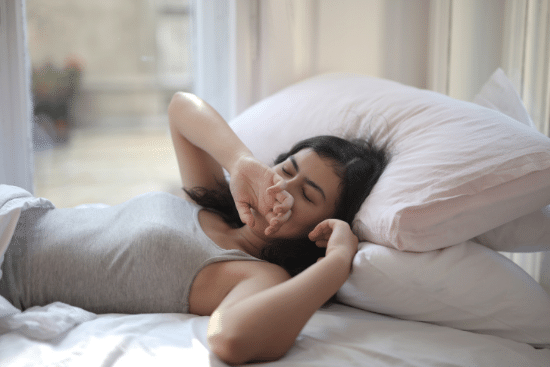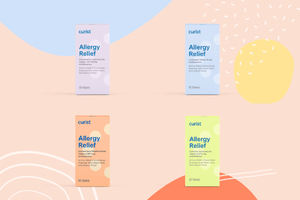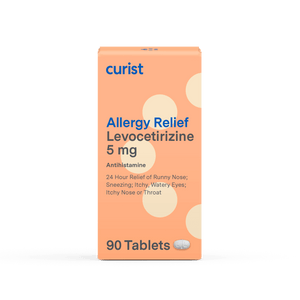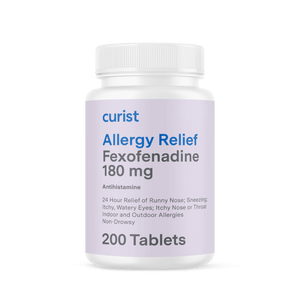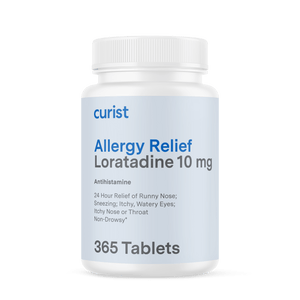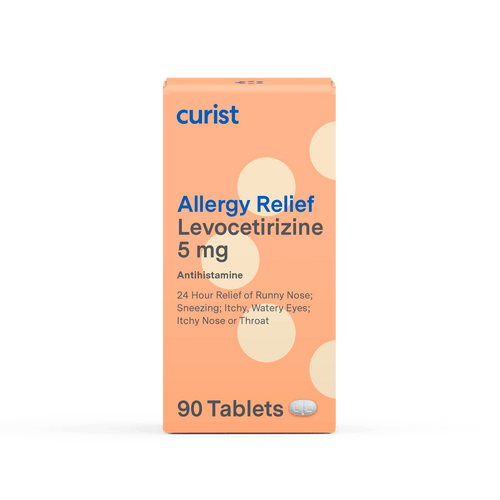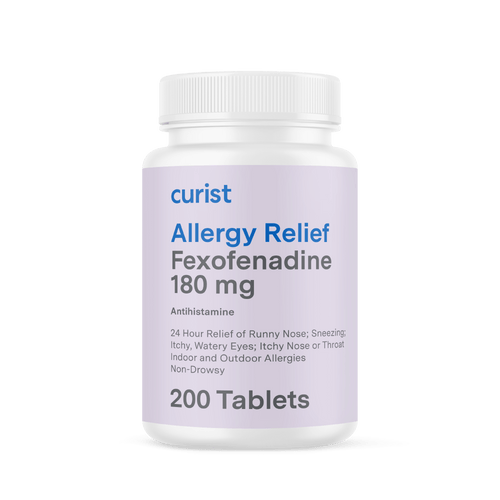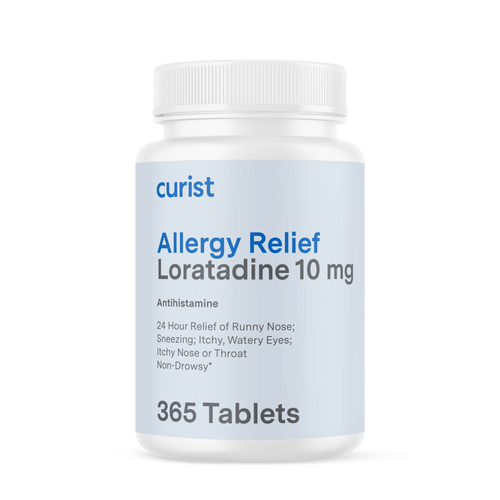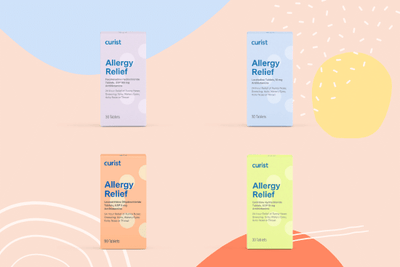By Allison Dinh, The University of Texas at Austin College of Pharmacy
Curist delivers over-the-counter medicines to your door at a fraction of the price of traditional brands. We hope everyone stays safe and healthy during this time.
If you find yourself constantly sneezing or having a stuffed up nose at night, you may be suffering from nighttime allergies. These allergy symptoms can interfere with the quality of your sleep and make for an uncomfortable night. Continue reading to learn more about these so-called sleep allergies and how to treat them so that you can go back to catching zzz’s.
Can Allergies Cause Sleep Problems?
Yes, allergies can affect your ability to fall asleep and stay asleep. Allergies comprise a host of symptoms such as nasal congestion, sneezing, and watery eyes – all of which can make it harder for you to breathe easily and have quality sleep. Specific sleep problems such as insomnia, increased snoring, and increased sleep apnea risk can occur as the result of allergies.
Can Lack of Sleep Make Allergies Worse?
A lack of sleep may indirectly make allergies worse. It has been found that stress may trigger the production of IgE antibodies which cause allergic reactions. Lack of sleep can worsen stress and therefore compound worsening allergies.
Why Do I Wake Up Sneezing in the Middle of the Night?
If you wake up sneezing in the middle of the night, this may be a sign that there are allergens in your bedroom. Bedrooms can host a number of different allergens such as pet dander, dust mites, and mold. Additionally, these rooms may be prone to collecting dust due to carpeted floors and objects ripe for harboring dust such as photo frames or lamps.
To prevent these sneeze attacks, try dusting your bedroom, regularly vacuuming the floors, and using an air purifier. You may also find that taking an allergy antihistamine before bed may help prevent symptoms from keeping you awake. If these nighttime sneezes persist, see your physician for other treatment and prevention options.
Why Do My Allergies Get Worse at Night or While Sleeping?
If your allergies get worse at night or during sleep, this may be due to the presence of allergens in your bedroom or your sleeping position. Household allergens can hide in many places in the bedroom–mold on the walls, dust on the carpet, pet hair on the sheets, and more. Therefore, this environment may trigger allergic reactions such as sneezing or watery eyes. Additionally, your sleeping position could be the cause of your worsening allergies. If you are laying on a flat pillow or in a way that obstructs your breathing, this can contribute to nasal congestion, a common allergy symptom. Consider raising your head with an extra pillow and sleeping upright to alleviate this.
Why is it Difficult to Breathe at Night because of Allergies?
Nasal congestion can often make it difficult to breathe at night. Unfortunately, allergies can exacerbate nasal congestion, especially if household allergens such as dust and pet dander lurk in your bedroom.
If you have difficulty breathing at night due to allergies, consider repositioning your head to a raised level, taking your allergy medication before bed, and cleaning your bedroom to minimize allergens.
What’s the Best Sleeping Position for Someone with Allergies?
If you sleep on your stomach or on a flat pillow, you might want to switch to a different position if you are looking to relieve allergy symptoms. Sleeping in an upright position with your head raised is going to be the best position for tackling congestion, which can be a common symptom for allergy sufferers. Keeping your head elevated allows you to take advantage of gravity and allow mucus to drain out.
How Can I Treat Sleep Allergies?
There isn’t a one-size-fits-all solution to sleep allergies. However, there are several strategies that you can implement to minimize allergens and get better sleep.
- Use an air purifier. Having an air purifier in your bedroom will help get rid of allergens such as dust mites, mold, and ped dander.
- Dust your bedroom. Strive to keep your sleeping quarters as dust-free as possible. Dust mites are common allergens and may trigger reactions that keep you up at night.
- Keep pets away. It can be difficult to stay away from your beloved cat or dog, but unfortunately, pet dander is another common allergen. Consider setting your pet’s bed outside of your bedroom to minimize allergic reactions.
- Shower before going to bed. If you’ve been outside all day, it’s likely that you’ve picked up some pollen on your clothes and body. Showering at night helps wash all of that pollen away so that you don’t carry it to bed.
Can Using a Fan at Night Help Allergies and Sleep?
If you have a ceiling fan, when was the last time you cleaned it? Likely, the answer is not recently. Ceiling fan blades can be an overlooked part of the cleaning process and end up collecting layers of dust. Additionally, the blades can spread dust throughout the room when the ceiling fan is turned on. As these scenarios suggest, ceiling fans are not quite ideal for allergy sufferers.
What about non-ceiling fans? Unfortunately, these can still dry out your nasal passages and worsen your allergy symptoms. Therefore, fans may not be helpful when it comes to allergies. However, if you prefer having a fan in your bedroom, that is perfectly fine! Just make sure that it is cleaned regularly so dust does not collect.
